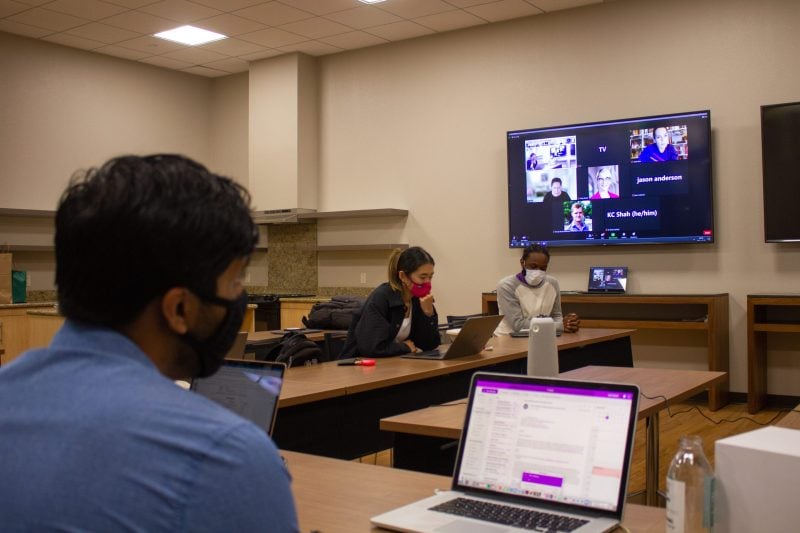The Graduate Student Council (GSC) called for increased mental health support from Stanford and for improvements to the current mail delivery system during its Wednesday meeting.
The discourse comes just hours after the University reported a public medical emergency at a graduate residence and weeks after the death of a law student. Councilors are becoming increasingly worried about what many see as a growing mental health crisis within Stanford’s graduate student communities, according to Emily Schell, a GSC councilor and fourth-year doctoral student in education. Staff members within the Graduate Life Office (GLO) told Schell that mental health services are currently overwhelmed with student demand and that staff are not being paid for additional pandemic-related tasks.
“GLO has been doing a herculean amount of student support work on the weekends, not getting paid late into the night,” Schell said. “This is an issue that Stanford has failed to make an institutional investment [in].”
Councilors said they are reaching out to the Stanford Board of Trustees to discuss existing support systems for student mental health. Schell called on the University to create a designated COVID-19 support fund for GLO and increase investment in Counseling and Psychological Services (CAPS) therapists amid a public mental health crisis.
Councilor and fourth-year Ph.D. student in education Jarita Greyeyes said that the issues with GLO point to broader issues with Stanford’s pandemic support system that have become clear amid uncertainties about the University’s in-person reopening and risks of infection.
“It is also speaking to larger issues around a plan to support students dealing with long COVID,” Greyeyes said. “We are focused right now on the immediate needs of students in isolation but it seems like there will be issues for people down the road.”
Councilors also raised concerns about mail and package deliveries for the graduate student community. GSC co-chair and fifth-year Ph.D. student in communication Sanna Ali said that the current package center at Tresidder Memorial Union is too far away for some graduate students and suggested a separate package center be installed in Escondido Village Graduate Residences (EVGR). The University recommends that graduate students who do not live in EVGR use the Graduate Package Center, according to the University’s website.
Residential & Dining Enterprises (R&DE) Executive Director Imogen Hinds said no plans are currently in place to install a package center in EVGR due to a lack of space, and added that such a move would decrease the available community spaces in EVGR. Hinds said the University is placing seven new lockers for graduate students on campus to better facilitate package deliveries. It is unclear if students will be able to receive multiple packages in a single locker as opposed to separate lockers, a topic that R&DE representatives said they will look into further.
With regard to mail deliveries, councilors expressed worries after meeting with R&DE that the United States Postal Service (USPS) is refusing to deliver mail to EVGR, which is a result of a national USPS policy change regarding college deliveries according to Councilor Tim Vrakas ’21 M.S. ’22, who also serves on The Daily’s Board of Directors. Though students outside of EVGR are currently grandfathered in the delivery system and are receiving mail from USPS, it is not clear if this will continue in the future.
“The mail [delivery system] is a disaster,” Vrakas said, adding that the issues are not entirely Stanford’s fault.
Amid the Lunar New Year, councilor and sixth-year mechanical engineering Ph.D. student Yiqing Ding said some Chinese students felt upset that Stanford’s Lunar New Year dining hall menu is not offered during the holiday’s precise dates and that it includes Thai and Japanese food. Ding said he received 50 messages from students demanding the menu contain more traditional Chinese dishes and added that more than 200 students are petitioning for the University to change the menu.
According to R&DE Stanford Dining Executive Director Eric Montell, the inability of dining halls to offer curated dishes on the holiday’s exact dates comes down to staffing issues. Montell said the menu’s broad-based options are meant to promote inclusivity based on student feedback, but invited students to meet with University representatives to express their concerns.
“We don’t call it Chinese New Year,” Montell said. “We call it Lunar New Year … so it’s really with that spirit in mind.”
Yiqing said that, after an email exchange with Montell, the University agreed to change the holiday menu to accommodate student concerns.
Montell added that dining halls are currently at 50% seating capacity and will increase to 75 and 100% over the next two weeks, respectively.
Members of Stanford’s Board of Judicial Affairs also requested input from councilors about proposals to refine Stanford’s Fundamental Standard and Honor Code. Councilors responded by citing student concerns about online surveillance and proctoring, which, according to Vrakas, have led to false accusations of cheating.
“I feel very strongly that proctoring is saying that we do not believe in what we’re preaching with the Fundamental Standard — that if you provide proctoring for exams, you are then saying that you don’t believe students are able to hold themselves to their own level of respect,” said councilor and second-year electrical engineering student Chloe Glikbarg. “[It] is inherently against what Stanford is about.”
This article has been updated to clarify that R&DE representatives responded that they will look into GSC concerns about package locker concerns and that some councilor concerns were voiced after R&DE representatives left the meeting. The Daily regrets these errors.
